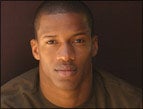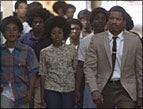In 'Blood', Nate Parker Confronts Race in America
In the new movie Blood Done Sign My Name, actor Nate Parker plays the role of Ben Chavis, a young teacher from a small town in North Carolina who confronts systemic racism in 1970. I recently spoke to him about the film and how it shaped his views of the current state of race relations in America.
von Buseck: How do you see the balance there as far as Hollywood is concerned between a 'message' film and the need to entertain an audience? A movie has to entertain to attract an audience. When you're looking at scripts, where do you strike the balance between the message on one side and the entertainment factor on the other?
 Parker: You follow your heart. I drew a line in the sand a long time ago. I never said I wouldn't do movies from other genres. That couldn't be further from the truth. However, I have to understand that it's not a 98% - 2% split. I'm going to do other films. I'm going to do action films. I'm going to do dramas. And if it's written with integrity, maybe a comedy. However, I just can't forget.
Parker: You follow your heart. I drew a line in the sand a long time ago. I never said I wouldn't do movies from other genres. That couldn't be further from the truth. However, I have to understand that it's not a 98% - 2% split. I'm going to do other films. I'm going to do action films. I'm going to do dramas. And if it's written with integrity, maybe a comedy. However, I just can't forget.
I think the Jewish community does it best. They never forget. The Jewish community will raise their kids to go to Jewish schools, then they may start a Jewish practice in law, and not only get wealthy doing their practice, but also supporting their people. They have a mantra: 'Never Forget.'
I think in the African-American community we have this great escape syndrome. We were taught at a very young age that we were inferior. And that anything you can do, by all means, escape. That's what I was taught. "Nate, you can get out of here. You can get out of this community." It's like the rose that grows from concrete. I was taught from a very young age, "Get away." The subliminal message in that is, "Get away from your own people." And the subliminal message in that is "Your people are inferior."
So when you make it you're not taught that you're human or equal, you're taught that you are the exception to the rule.
von Buseck: I think your character in this film is the embodiment of what you are trying to say. As you were preparing for this role, and learning of Ben Chavis' actions as a leader in this non-violent protest, how did that affect his future and what he went on to become?
Parker: There are two words that best describes Dr. Benjamin Chavis in my eyes -- one is 'hero' and the other is 'sacrifice.' You can't separate these two -- it could be one word. I think he was a hero because he sacrificed. He stood up to the injustice, but in doing so he lost his job as a teacher. He led this boycott that was successful. He went to Wilmington, and from there he ended up going to jail for ten years of his life before it was overturned. He was part of the Wilmington Ten.
Before he went to Wilmington he went to Portsmouth, Virginia, and fought to keep I. C. Norcom High School open. The city was going to close it. If the people at I. C. Norcom knew that someone fought to keep that school open, that's identity. There would be a sense of pride in that, knowing that they tried to close our school years ago, in the Seventies, but there was a man named Dr. Benjamin Chavis that came here and fought to keep it open.
He spent ten years of his life in prison and came out and wasn't bitter. He could have come out and went to another country and said, 'this country doesn't appreciate me. I'm going to go somewhere where I'm more accepted.' But he still continued to struggle. He led the 'Million Man March.' He was part of the Hip Hop Summit of the Action Network. But it started then.
For me to prepare for this role I said, 'O.K., how did Dr. Chavis get his skill set?' And I realized there was a legacy of men that went before him. Ben Chavis, Sr., his father, was a minister, and he fought in the war. He was a strict father. He had principles that he stood on. And his Great, Great Grandfather, John Chavis, was an educator in the 1800s who taught slave children to read and got killed for it eventually. They beat him to death and they couldn't find the killers. So when you're standing on those shoulders; when your mother is telling you as a kid, 'you are a Chavis -- your Great, Great Grandfather died for your education,' there is a pride associated with that.
That's the same pride we need to instill in our children now.
von Buseck: Yes.
Parker: When you believe that your existence started in the belly of a slave ship, then it's easy to see how you feel that anything that isn't a slave is living. 'Hey, I ain't no slave no more. It doesn't matter if I'm illiterate.' You know what I mean?
I think there needs to be a big push to remind our young people that the African empires are just prominent and just as relevant as the Roman Empire.
von Buseck: The writer and director of your new movie, Blood Done Sign My Name, is Jeb Stuart. He wrote Die Hard and The Fugitive, among other films. He said of your performance, "I feel that Nate Parker's portrayal of Ben Chavis embodies every bit as much 'everyman' heroism as, say, Harrison Ford's Dr. Richard Kimble in The Fugitive. He is challenged, he confronts it, fails, overcomes failure, and grinds out his victory through his own labors." How was it that you approached the role in order to bring that 'everyman' persona forward?
 Parker: There is a quote that my friend says: "My loyalty is to truth, not to consistency." I think that is my mantra when I seek out a role in my research. I reminded myself that if I try to imitate Dr. Chavis I'll fail. I'll fail miserably. Eating the way he eats and sitting the way he sits, that's not capturing his ideals. I wanted to understand what was the truth that he was trying to portray in seeking an end to that injustice? What was the truth? What was he thinking? Why was he thinking it? How did he feel? What was the turmoil going on in his head?
Parker: There is a quote that my friend says: "My loyalty is to truth, not to consistency." I think that is my mantra when I seek out a role in my research. I reminded myself that if I try to imitate Dr. Chavis I'll fail. I'll fail miserably. Eating the way he eats and sitting the way he sits, that's not capturing his ideals. I wanted to understand what was the truth that he was trying to portray in seeking an end to that injustice? What was the truth? What was he thinking? Why was he thinking it? How did he feel? What was the turmoil going on in his head?
I felt it was very much an internal character. He wasn't one of the people to hit the streets and break windows. He wasn't super militant and angry. He wasn't one of the Viet Nam vets. He wasn't one of the young students that were looting. He wasn't one of the elders that were afraid to come outside.
He wasn't them, but he was all of them at the same time.
So his task was to discover, 'how do you create solidarity in a volatile environment?' And that's what he succeeded in doing. And that's was the approach I took to this character.
Nate and I speak further on the state of race relations in America in this interview: Civil Rights: How Far Have We Come?
Learn more about Nate's new movie, Blood Done Sign My Name
More on Nate Parker:
The Great Debaters: Let Freedom Ring This Year
More from CBN.com's Black History Special Feature
More from ChurchWatch
More from CBN.com's Entertainment Feature
More from Spiritual Life
More from CBN News
More from CBN's Christian World News
More from Craig von Buseck on CBN.com